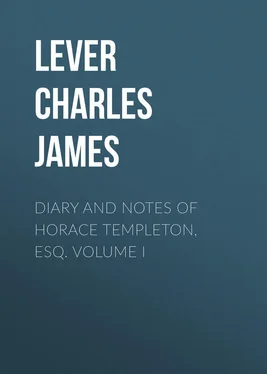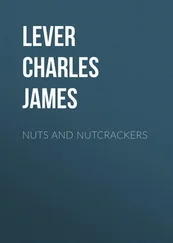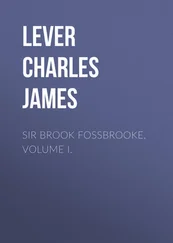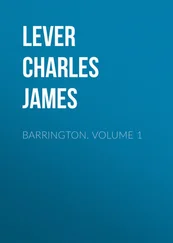Charles Lever - Diary And Notes Of Horace Templeton, Esq. Volume I
Здесь есть возможность читать онлайн «Charles Lever - Diary And Notes Of Horace Templeton, Esq. Volume I» — ознакомительный отрывок электронной книги совершенно бесплатно, а после прочтения отрывка купить полную версию. В некоторых случаях можно слушать аудио, скачать через торрент в формате fb2 и присутствует краткое содержание. Жанр: literature_19, foreign_antique, foreign_prose, на английском языке. Описание произведения, (предисловие) а так же отзывы посетителей доступны на портале библиотеки ЛибКат.
- Название:Diary And Notes Of Horace Templeton, Esq. Volume I
- Автор:
- Жанр:
- Год:неизвестен
- ISBN:нет данных
- Рейтинг книги:4 / 5. Голосов: 1
-
Избранное:Добавить в избранное
- Отзывы:
-
Ваша оценка:
- 80
- 1
- 2
- 3
- 4
- 5
Diary And Notes Of Horace Templeton, Esq. Volume I: краткое содержание, описание и аннотация
Предлагаем к чтению аннотацию, описание, краткое содержание или предисловие (зависит от того, что написал сам автор книги «Diary And Notes Of Horace Templeton, Esq. Volume I»). Если вы не нашли необходимую информацию о книге — напишите в комментариях, мы постараемся отыскать её.
Diary And Notes Of Horace Templeton, Esq. Volume I — читать онлайн ознакомительный отрывок
Ниже представлен текст книги, разбитый по страницам. Система сохранения места последней прочитанной страницы, позволяет с удобством читать онлайн бесплатно книгу «Diary And Notes Of Horace Templeton, Esq. Volume I», без необходимости каждый раз заново искать на чём Вы остановились. Поставьте закладку, и сможете в любой момент перейти на страницу, на которой закончили чтение.
Интервал:
Закладка:
Painters and anglers, I have remarked, are always silent, thoughtful men. Of course I would not include under this judgment such as portrait and miniature painters, who are about, as a class, the most tiresome and loquacious twaddlers that our unhappy globe suffers under. Wilkie must have been a real blessing to any man sentenced to sit for his picture: he never asked questions, seldom indeed did he answer them; he had nothing of that vulgar trick of calling up an expression in his sitter; provided the man staid awake, he was able always to catch the traits of feature, and, when he needed it, evoke the prevailing character of the individual’s expression by a chance word or two. Lawrence was really agreeable – so, at least, I have always heard, for he was before my day; but I suspect it was that officious agreeability of the artist, the smartness that lies in wait for a smile or the sparkle of the eye, that he may transmit it to the panel.
The great miniature painter of our day is really a specimen of a miniature intelligence – the most incessant little driveller of worse than nothings: the small gossip that is swept down the back-stairs of a palace, the flat commonplaces of great people, are his stock-in-trade: the only value of such contributions to history is, that they must be true. None but kings could be so tiresome! I remember once sitting to this gentleman, when only just recovering from an illness, and when possibly I endured his forced and forty-horse power of small talk with less than ordinary patience. He had painted nearly every crowned head in Europe – kings, kaisers, archdukes, and grand-duchesses in every principality, from the boundless tracts of the Czar’s possessions, to those states which emulate the small green turf deposited in a bird’s cage. Dear me! how wearisome it was to hear him recount the ordinary traits that marked the life of great people, as if the greatest Tory of us all ever thought Kings and Queens were anything but men and women!
I listened, as though in a long distressing dream, to narratives of how the Prince de Joinville, so terribly eager to burn our dockyards and destroy our marine, could be playful as a lamb in his nursery with the children. How Louis Philippe held the little Count de Paris fast in his chair till his portrait was taken. (Will he be able to seat him so securely on the throne of France?) How the Emperor of Austria, with a simplicity of a great mind and a very large head, always thought he could sit behind the artist and watch the progress of his own picture! I listened, I say, till my ears tingled and my head swam, and in that moment there was not a “bounty man” from Kentucky or Ohio that held royalty more cheaply than myself. Just at this very nick my servant came to whisper me, that an agent for Messrs. Lorch, Rath; et Co., the wine-merchants of Frankfort, had called, by my desire, to take an order for some hock. Delighted at the interruption, I ordered he should be admitted, and the next moment a very tall pretentious-looking German, with a tremendously frogged and Brandenburged coat, and the most extensive beard and moustaches, entered, and with all the ceremonial of his native land saluted us both, three times over.
I received him with the most impressive and respectable politeness, and seemed, at least, only to resume my seat after his expressed permission. The artist, who understood nothing of German, watched all our proceedings with a “miniature eye,” and at last whispered gently, “Who is he?”
“Heavens!” said I, in a low tone, “don’t you know? – he is the Crown Prince of Hanover!”
The words were not uttered when my little friend let fall his palette and sprang off his chair, shocked at the very thought of his being seated in such presence. The German turned towards him one of those profoundly austere glances that only a foreign bagman or an American tragedian can compass, and took no further notice of him.
The interview over, I accompanied him to the antechamber, and then took my leave, to the horror of Sir C – , who asked me at least twenty times, “why I did not go down to the door?”
“Oh, we are old friends,” said I; “I knew him at Gottingen a dozen years ago, and we never stand on any ceremony together.” My fiction, miserable as it was, served me from further anecdotes of royalty, since what private history of kings could astonish the man on such terms of familiarity with the Crown Prince of Hanover?
Talking of Hanover, and apropos of “humbugs,” reminds me of a circumstance that amused me at the time it occurred. Soon after the present King of Hanover ascended the throne, the Orangemen of Ireland, who had long been vain of their princely Grand Master, had sufficient influence on the old corporation of Dublin to carry a motion that a deputation should be despatched to Hanover, to convey to the foot of the throne the sincere and respectful gratulations of the mayor, aldermen, and livery of Dublin on the auspicious advent of his Majesty to the crown of that kingdom. The debate was a warm one, but the majority which carried the measure large; and, now, nothing remained but to name the happy individuals who should form the deputation, and then ascertain in what part of the globe Hanover lay, and how it should be come at.
Nothing but the cares of state and the important considerations of duty, could prevent the mayor himself accepting this proud task: the sheriffs, however, were free. Their office was a sinecure, and they accordingly were appointed, with a sufficient suite, fully capable of representing to advantage, abroad, the wealth, splendour, and intelligence of the “ancient and loyal corporation.”
One of the sheriffs, and the chief member of the mission, was, if I remember aright, a Mr. Timothy Brien; the name of the “lesser bear” I have forgotten. Tim was, however, the spokesman, whenever speaking was available; and when it was not, it was he that made the most significant signs.
I was at the period a very young attaché of the mission at Hanover; our secretary, Melmond, being chargé d’affaires in the absence of our chief, Melmond was confined to bed by a feverish attack, and the duties of the mission, limited to signing a passport or two once a-month, or some such form, were performed by me. Despatches were never sent. The Foreign Office told us, if we had any thing to say, to wait for the Russian courier passing through, but not to worry them about anything. I therefore had an easy post, and enjoyed all the dignities of office without its cares. If I had only had the pay, I could have asked nothing better.
It was, then, of a fine morning in May that Count Beulwitz, the Minister for Foreign Affairs, was announced, and the same moment entered my apartment. I was, I own it, not a little fluttered and flattered by this mark of recognition on the part of a minister, and resolved to play my part as deputy assistant chargé d’affaires to my very utmost.
“I come, Mr. Templeton,” said the minister, in a voice not quite free from agitation, “to ask your counsel on a question of considerable nicety; and as Mr. Melmond is still unable to attend to duty, you must excuse me if I ask you to bestow the very gravest attention upon the point.”
I assumed the most Talleyrand of looks, and he went on.
“This morning there has arrived here in four carriages, with great pomp and state, a special mission, sent from Ireland to convey the congratulations of the government on his Majesty’s accession to the throne. Now we have always believed and understood that Ireland was a part of the British empire, living under the same monarchy and the same laws. If so, how can this mission be accredited? It would be a very serious thing for us to recognise the partition of the British empire, or the separation of an integral portion, without due thought and consideration.
Читать дальшеИнтервал:
Закладка:
Похожие книги на «Diary And Notes Of Horace Templeton, Esq. Volume I»
Представляем Вашему вниманию похожие книги на «Diary And Notes Of Horace Templeton, Esq. Volume I» списком для выбора. Мы отобрали схожую по названию и смыслу литературу в надежде предоставить читателям больше вариантов отыскать новые, интересные, ещё непрочитанные произведения.
Обсуждение, отзывы о книге «Diary And Notes Of Horace Templeton, Esq. Volume I» и просто собственные мнения читателей. Оставьте ваши комментарии, напишите, что Вы думаете о произведении, его смысле или главных героях. Укажите что конкретно понравилось, а что нет, и почему Вы так считаете.












